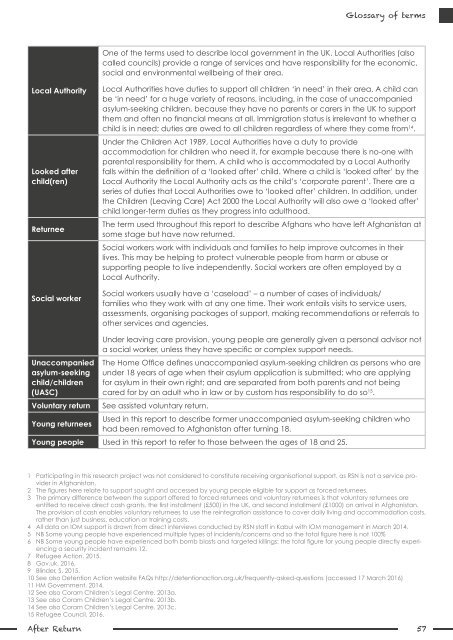After Return
After%20Return_RSN_April%202016
After%20Return_RSN_April%202016
Create successful ePaper yourself
Turn your PDF publications into a flip-book with our unique Google optimized e-Paper software.
Glossary of terms<br />
One of the terms used to describe local government in the UK. Local Authorities (also<br />
called councils) provide a range of services and have responsibility for the economic,<br />
social and environmental wellbeing of their area.<br />
Local Authority<br />
Looked after<br />
child(ren)<br />
<strong>Return</strong>ee<br />
Social worker<br />
Local Authorities have duties to support all children ‘in need’ in their area. A child can<br />
be ‘in need’ for a huge variety of reasons, including, in the case of unaccompanied<br />
asylum-seeking children, because they have no parents or carers in the UK to support<br />
them and often no financial means at all. Immigration status is irrelevant to whether a<br />
child is in need; duties are owed to all children regardless of where they come from 14 .<br />
Under the Children Act 1989, Local Authorities have a duty to provide<br />
accommodation for children who need it, for example because there is no-one with<br />
parental responsibility for them. A child who is accommodated by a Local Authority<br />
falls within the definition of a ‘looked after’ child. Where a child is ‘looked after’ by the<br />
Local Authority the Local Authority acts as the child’s ‘corporate parent’. There are a<br />
series of duties that Local Authorities owe to ‘looked after’ children. In addition, under<br />
the Children (Leaving Care) Act 2000 the Local Authority will also owe a ‘looked after’<br />
child longer-term duties as they progress into adulthood.<br />
The term used throughout this report to describe Afghans who have left Afghanistan at<br />
some stage but have now returned.<br />
Social workers work with individuals and families to help improve outcomes in their<br />
lives. This may be helping to protect vulnerable people from harm or abuse or<br />
supporting people to live independently. Social workers are often employed by a<br />
Local Authority.<br />
Social workers usually have a ‘caseload’ – a number of cases of individuals/<br />
families who they work with at any one time. Their work entails visits to service users,<br />
assessments, organising packages of support, making recommendations or referrals to<br />
other services and agencies.<br />
Unaccompanied<br />
asylum-seeking<br />
child/children<br />
(UASC)<br />
Voluntary return<br />
Young returnees<br />
Under leaving care provision, young people are generally given a personal advisor not<br />
a social worker, unless they have specific or complex support needs.<br />
The Home Office defines unaccompanied asylum-seeking children as persons who are<br />
under 18 years of age when their asylum application is submitted; who are applying<br />
for asylum in their own right; and are separated from both parents and not being<br />
cared for by an adult who in law or by custom has responsibility to do so 15 .<br />
See assisted voluntary return.<br />
Used in this report to describe former unaccompanied asylum-seeking children who<br />
had been removed to Afghanistan after turning 18.<br />
Young people Used in this report to refer to those between the ages of 18 and 25.<br />
1 Participating in this research project was not considered to constitute receiving organisational support, as RSN is not a service provider<br />
in Afghanistan.<br />
2 The figures here relate to support sought and accessed by young people eligible for support as forced returnees.<br />
3 The primary difference between the support offered to forced returnees and voluntary returnees is that voluntary returnees are<br />
entitled to receive direct cash grants, the first installment (£500) in the UK, and second installment (£1000) on arrival in Afghanistan.<br />
The provision of cash enables voluntary returnees to use the reintegration assistance to cover daily living and accommodation costs,<br />
rather than just business, education or training costs.<br />
4 All data on IOM support is drawn from direct interviews conducted by RSN staff in Kabul with IOM management in March 2014.<br />
5 NB Some young people have experienced multiple types of incidents/concerns and so the total figure here is not 100%<br />
6 NB Some young people have experienced both bomb blasts and targeted killings: the total figure for young people directly experiencing<br />
a security incident remains 12.<br />
7 Refugee Action. 2015.<br />
8 Gov.uk. 2016.<br />
9 Blinder, S. 2015.<br />
10 See also Detention Action website FAQs http://detentionaction.org.uk/frequently-asked-questions (accessed 17 March 2016)<br />
11 HM Government. 2014.<br />
12 See also Coram Children’s Legal Centre. 2013a.<br />
13 See also Coram Children’s Legal Centre. 2013b.<br />
14 See also Coram Children’s Legal Centre. 2013c.<br />
15 Refugee Council. 2016.<br />
<strong>After</strong> <strong>Return</strong> 57


